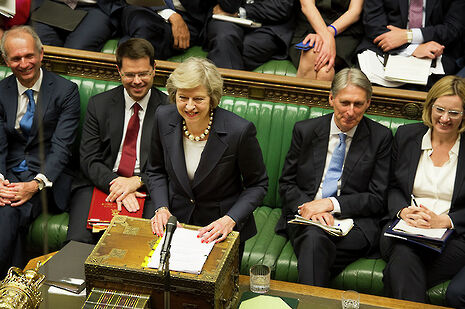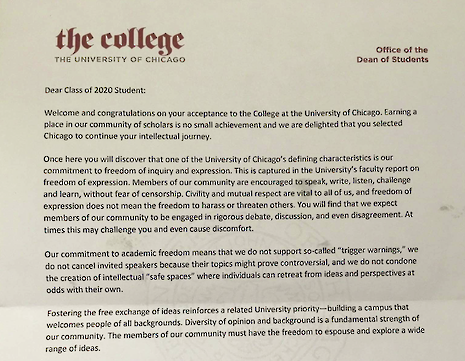On the vitriol against safe spaces
Theresa May has become the most recent public figure to join the campaign against safe spaces, arguing that free speech, a “fundamental British value”, has come under threat

Since condemnation of safe spaces has become en vogue, it’s of no surprise that MP Victoria Atkins called on Theresa May to condemn them, accusing them of stifling “lively debate” and “undermining” freedom of speech. Nor is it surprising that May, who congratulates herself on her ‘feminism’ and championing ‘social justice’, hopped onto the bandwagon and performed outrage at them. It is interesting that Atkins, so concerned for the moral fabric of British universities, finds that attacking minorities seeking comfort from hate speech and harassment takes priority over addressing actual hate speech and harassment, or perhaps the under-representation of marginalised groups in top institutions.
And yet the glittering generality of May’s response, that “we want to see that innovation of thought [is] taking place in our universities… that’s how we develop as a country, as a society, and as an economy”, exposes how reductive and lazy engagement with safe space ‘culture’ is. It fails to consider the intellectual growth and empowerment which is achieved by minority students within these spaces, for the sake of perpetuating entitlement of access to the privileged majority. Rather than engaging, those opposed retreat to tired triplets of protecting development “as a country, as a society, and as an economy” to gratify ego-politics and engender praise and roars from the majority.
Perhaps if this discourse wasn’t predicated on the probing of minorities’ very right to exist and navigate spaces with the same comfort enjoyed by their more privileged peers, I could dismiss it as sheer laziness. However, that such toxic mockery of safe spaces has gained institutional and governmental backing is a reminder that the minority fight for fundamental respect, existence and visibility against institutionalised privilege is far from over. That those of us who are tired, angered and dispirited by the wilful misunderstanding of safe spaces, and trigger warnings for the sake of performing tropes of “no nonsense” and “cracking down”, are being repeatedly failed by institutions is depressing and enraging.
It is troubling that certain demographics consider safe spaces to be a form of censorship when safe spaces are purpose-built as a response to censorship. By creating accessible spaces in which participants feel they can access content and conversations without infringement, and develop on ideas and content which may otherwise be triggering or offensive, in fact the expansion of discourse is facilitated by such spaces. They empower minorities to meditate on what is racist, ableist, sexist or transphobic and provide the intellectual resources and solidarity to critique institutional privilege and oppression. There is so much intellectual value in safe spaces: as black, queer and neurodiverse I can learn much from operating in spaces where voices like mine are important for a change, and which will be accessible for people like me. Safe spaces also provide vital expression for those who are survivors of trauma and abuse, allowing them to access spaces in which they can speak on pain and experience without detraction and with full emotional honesty. That the most privileged groups believe they are entitled to penetrate such spaces, claiming their exclusion negates the potential for ‘academic rigour’ and ‘true intellectual scope’, only mirrors what institutions enforce when they produce all-white, all-male reading lists and label this the ‘canon of thought’. The notion of safe spaces negating ideological diversity is simply untrue – they allow marginalised students to experience intellectual growth without needless stifling and relentless detraction from dominant groups under the pretension of ‘devil’s advocate’.
To add, the alleged necessity for ‘devil’s advocates’ and ‘debate for debate’s sake’ is tiring. I ask myself, is my male or cis opinion truly needed in a women’s or trans’ space? I ask you, is your white, straight, or able opinion truly needed in corresponding marginalised spaces? There are those who indeed view their ‘otherness’ to the marginalised as cause for celebration in academic spaces – they believe they can take the ‘neutral’ and ‘objective’ view of a subject because they have no emotional ties to it. But the objective and ‘scientific’ probing of women’s, BME, trans and disabled identities has laid the foundation for centuries of dehumanisation, disenfranchisement and genocide. I ask if Germaine Greer’s denial of a transwomen’s right to existence is truly the beacon of academic rigour and integrity, and I ask again if not entertaining their dehumanisation is the pinnacle of oppression when a transwoman is murdered every 29 hours because of the promotion of views like Greer’s?

There is empty value placed on the mythical ability to be ‘neutral’ in identity politics. It taps into what Enrique Dussel identifies as a notion of having a ‘God-Eye view’ over knowledge, and the positioning of western male whiteness as the harbourer of universal knowledge. There is a view that intelligence shaped by pure philosophising is superior to intelligence which is shaped by pain and experience, something rooted in the Cartesian philosophy “I think, therefore I am”. In reality, ‘neutral’ internal monologues, which result in ‘critical’ expressions of “well, actually…”, are mythical. There is no such ego-complex which manufactures ‘unbiased, pure knowledge’ in issues of identity, yet anything not fitting this ego-political view of valuable knowledge being divorced of emotional attachment is dismissed as irrational, biased and ridiculous. Certainly this is why opposition to safe spaces refuses to respect marginalised students enough to engage with this issue properly. Well, actually my identity is not for your dissection because you declare yourself ‘neutral’ and public school has convinced you that intellectual development is based on arbitrary notions of ‘for’ and ‘against’. Who truly learns and develops from this model of debate, other than in how to perform debate for debate’s sake? As such, Paris Lees states of how critics “use trans people as an academic data point and fabricate these absurd ‘debates’ like whether or not people like me should be able to use the women’s toilets, and then go back to their nice big homes, and forget all about it... There’s no emotional cost to them personally. It’s these middle-class people who just love debate for debate’s sake.” She asserts: “being trans is my life, not an intellectual wank.”
So what is this epidemic against safe spaces really about? Contained within the hue and cry is centuries of suspicion and destruction of spaces minorities build for themselves. Disenfranchised African-Americans built the ‘Black Wall Street’; the response was the Tulsa race riot of 1921. Trinity women held a breakfast to celebrate 40 years of their admission; the response was male tears flooding the River Cam to knock the ‘feminazi ship’ off course. The trend is clear: when those who are accustomed to privilege and supremacy discover spaces which deny them access, they want to see them come tumbling down. It is hence difficult to see safe spaces as “freedom of speech under attack” when government “Prevent” strategies monitor and censor the activity of Muslim students under suspicion of radicalisation, which has led to Muslim children being embroiled in terror alerts and Muslim students unable to assemble without bureaucratic interrogation. It is also unsurprising that May, who has railroaded surveillance bills which promote paranoia over the activities of marginalised groups, hates safe spaces. Atkins labelled safe spaces as born from a minority of students’ “ridiculous sense of entitlement”, yet it is the entitlement of the privileged majority to snoop into minority activity which has heavy consequences for students. May has clearly forgotten that she is dependent on ‘safe spaces’ to snoop on minority groups.
The hypocrisy is so far-reaching that many cannot even identify how universities are routinely structured as an ensemble of safe spaces. Academic freedom and diversity are dependent on separating subjects within departments and factions. There isn’t uniformity over the legitimacy of modes of inquiry and academic research; certainly there are shared themes and topics in English and History, yet the departments are protected from routine interruption and interrogation of research methods from the other to allow academic freedom and development. Safe spaces function near identically – it’s not an issue when white men create factions, so why is it an issue when minorities do?
Perhaps it is unrealistic to expect a publicly sensitive and considerate evaluation of safe spaces. It is, after all, a historical colonial trend to stamp on minorities and ridicule ideologies born from pain and resistance. But that May champions herself as a feminist and spoke of extending Cameron’s “legacy of social justice” and yet abrasively condemns spaces which allow the flourishing of marginalised students and survivors alike exposes a smokescreen of concern for “freedom” employed for personal and political gain. And that people are still refusing to properly engage with safe spaces or take minorities seriously is an indicator that we still have a long road ahead to be respected as intellectual equals.
 News / Uni Scout and Guide Club affirms trans inclusion 12 December 2025
News / Uni Scout and Guide Club affirms trans inclusion 12 December 2025 News / Cambridge Vet School gets lifeline year to stay accredited28 November 2025
News / Cambridge Vet School gets lifeline year to stay accredited28 November 2025 News / Pembroke to convert listed office building into accom9 December 2025
News / Pembroke to convert listed office building into accom9 December 2025 Features / Searching for community in queer Cambridge10 December 2025
Features / Searching for community in queer Cambridge10 December 2025 News / Uni redundancy consultation ‘falls short of legal duties’, unions say6 December 2025
News / Uni redundancy consultation ‘falls short of legal duties’, unions say6 December 2025









